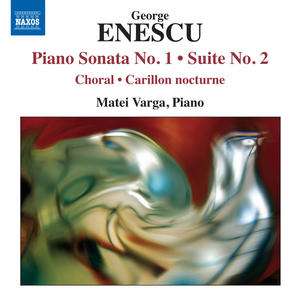|
Back
02/08/2011
George Enescu: Piano Sonata No. 1 in F sharp minor, Op. 24, No. 1 – Choral and Carillon nocturne from Pièces impromptus, Op. 18 No. 6 & 7 – Suite No.2 in D major, Op. 10
Matei Varga (piano)
Recorded in New York City, New York, Patrych Sound Studios (September 25-30, 2008) – 65’59
Naxos 8.572120 – Liner notes in English

George Enescu (1881- 1955), largely known today for his first folk-inspired Romanian Rhapsody, has had less exposure than he deserves in recent years. This exciting new CD of early piano works performed by the New York-based Romanian, Matei Varga, is long overdue and therefore welcome. Varga was a prizewinner at the Maria Canals Competition in Barcelona, the Porto International Piano Competition and the George Enescu Competition in Bucharest, where he was awarded a special prize for the best performance of the Piano Sonata No. 1 which introduces this program.
Enescu was a major musical figure in early 20th century Paris. He studied with Massenet and Fauré, influenced Ravel, among others, and was an accomplished violinist, pianist and conductor. His students included Arthur Grumiaux, Christian Ferras and Ivry Gitlis and he was an early promoter of his compatriots Clara Haskil and Dinu Lipatti. His student Yehudi Menuhin called him “the greatest musician,” and Pablo Casals, no less, believed he was “the most amazing musician since Mozart”. The music on this CD is a worthy testament to these accolades. It can stand up to that of Ravel and Debussy, and on American shores, Charles Ives.
The impressionistic Piano Sonata No. 1, written in 1924 (he would write a second in 1933-35), is a wide-arching, introspective piece which opens with shimmering water imagery before giving way to interior struggles. The middle scherzo movement paints a fanciful, playful sketch with racing forward energy. Unusually, the slowest movement (andante) concludes the sonata with a return to evocative meditations through its silken arpeggios and delicate explorations of the extreme registers of the piano.
Varga has chosen for this disc two of the seven Pièces impromptus, Op. 18, written between 1913 and 1916–“Choral,” a calm meditation of sustained, unmeasured bar lengths framed by imposing cascades of chords and delicate filigrees, and the elegiac “Carillon nocturne” whose clanging bell-like overtones evoke wistful, melancholic colors.
The last work, and the first to be composed, Suite No. 2 in D major (1903), is the most melodic of the three. It comprises four dances harking back to the Baroque era. The stately Toccata closely resembles the principal theme from the melody of the opening lyrics of “Loch Lomond”—“I’ll take the high road ...” The “Sarabande” and the “Pavane” are quiet, delicate meditations interpreted with a light, poetic touch. The concluding joyful, uplifting “Bourrée” is a welcome respite from the more sombre and melancholic pieces on the CD.
Matei Varga offers nuanced and refined interpretations of these works. The recorded sound is immaculate and the liner notes by Anthony Short excellent. One can only hope for a subsequent release from Naxos of the remainder of Enescu’s piano compositions.
Earl Arthur Love
|